英语语法非谓语动词
- 格式:doc
- 大小:51.00 KB
- 文档页数:17
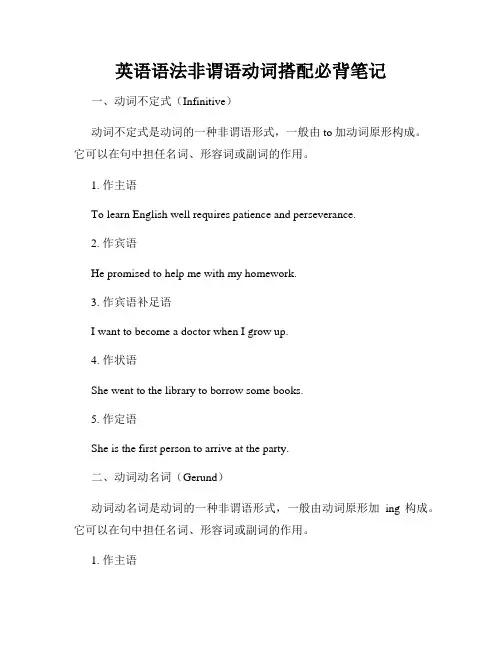
英语语法非谓语动词搭配必背笔记一、动词不定式(Infinitive)动词不定式是动词的一种非谓语形式,一般由to加动词原形构成。
它可以在句中担任名词、形容词或副词的作用。
1. 作主语To learn English well requires patience and perseverance.2. 作宾语He promised to help me with my homework.3. 作宾语补足语I want to become a doctor when I grow up.4. 作状语She went to the library to borrow some books.5. 作定语She is the first person to arrive at the party.二、动词动名词(Gerund)动词动名词是动词的一种非谓语形式,一般由动词原形加ing构成。
它可以在句中担任名词、形容词或副词的作用。
1. 作主语Swimming is my favorite sport.2. 作宾语I enjoy painting in my free time.3. 作宾语补足语She kept her promise of helping the poor.4. 作状语He left without saying goodbye.5. 作定语The running water sounds very soothing.三、现在分词(Present Participle)现在分词是动词的一种非谓语形式,一般由动词原形加ing构成。
它可以在句中担任形容词或副词的作用。
1. 作定语The crying baby woke up everyone in the house.2. 作状语She entered the room, singing a beautiful song.四、过去分词(Past Participle)过去分词是动词的一种非谓语形式,一般由动词的过去分词形式构成。
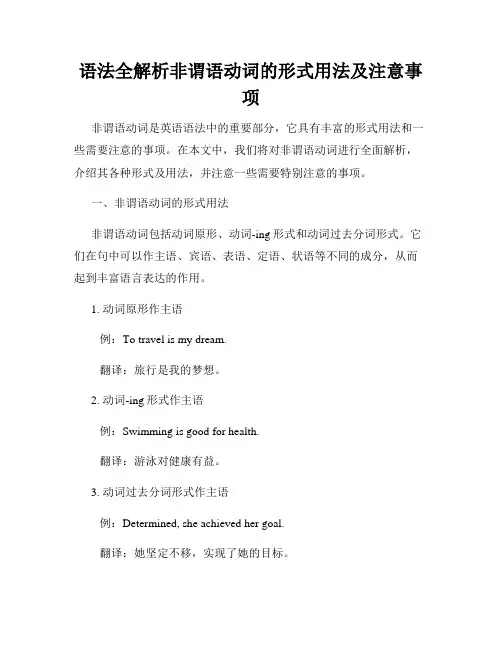
语法全解析非谓语动词的形式用法及注意事项非谓语动词是英语语法中的重要部分,它具有丰富的形式用法和一些需要注意的事项。
在本文中,我们将对非谓语动词进行全面解析,介绍其各种形式及用法,并注意一些需要特别注意的事项。
一、非谓语动词的形式用法非谓语动词包括动词原形、动词-ing形式和动词过去分词形式。
它们在句中可以作主语、宾语、表语、定语、状语等不同的成分,从而起到丰富语言表达的作用。
1. 动词原形作主语例:To travel is my dream.翻译:旅行是我的梦想。
2. 动词-ing形式作主语例:Swimming is good for health.翻译:游泳对健康有益。
3. 动词过去分词形式作主语例:Determined, she achieved her goal.翻译:她坚定不移,实现了她的目标。
4. 动词-ing形式作定语例:The running water is clear.翻译:流水清澈。
5. 动词过去分词形式作定语例:The broken vase needs to be fixed.翻译:那个破碎的花瓶需要修理。
6. 动词原形作宾语例:I want to learn English.翻译:我想学英语。
7. 动词-ing形式作宾语例:She enjoys reading books.翻译:她喜欢读书。
8. 动词过去分词形式作宾语例:We have finished our homework.翻译:我们已经完成了作业。
9. 动词-ing形式作状语例:He left without saying goodbye.翻译:他走了,没有说再见。
10. 动词过去分词形式作状语例:Exhausted, she fell asleep quickly.翻译:她累得很,很快就睡着了。
二、非谓语动词的注意事项在使用非谓语动词时,需要注意以下几个问题:1. 动词-ing形式与动词过去分词形式的区别动词-ing形式表示正在进行的动作,而动词过去分词形式则表示已经完成的动作或状态。

非谓语动词在句首的用法在英语学习中,非谓语动词是一个重要且具有一定难度的语法点。
当非谓语动词出现在句首时,其用法更是需要我们仔细分辨和理解。
非谓语动词包括动词不定式(to do)、动名词(doing)和分词(现在分词 doing 和过去分词 done)。
首先,我们来谈谈动词不定式置于句首的情况。
动词不定式在句首通常用作目的状语,表示某一动作的目的。
例如:“To learn English well, we need to practice speaking every day”(为了学好英语,我们需要每天练习说。
)这里的“To learn English well”就是目的状语,清晰地表明了后面“we need to practice speaking every day”这个行为的目的。
另外,动词不定式在句首有时也用作主语,表示某个具体的动作或行为。
例如:“To err is human; to forgive, divine”(人孰无过;宽恕乃神圣之举。
)在这个句子中,“To err”和“To forgive”分别充当了两个分句的主语。
接下来是动名词在句首的用法。
动名词在句首通常作主语,表示一个一般性的、习惯性的动作或状态。
比如:“Doing exercise regularly is good for our health”(经常做运动对我们的健康有好处。
)这里“Doing exercise regularly”就是一个习惯性的动作,被用作主语来阐述其对健康的影响。
动名词在句首还可以作表语,用来描述主语的性质或状态。
例如:“Her job is teaching English”(她的工作是教英语。
)“Teaching English”在这个句子中作表语,说明了“Her job”的性质。
再说说现在分词在句首的情况。
现在分词在句首作状语时,往往表示伴随、原因、时间等。
例如:“Walking along the street, I saw an old friend”(沿着街道走的时候,我看到了一位老朋友。
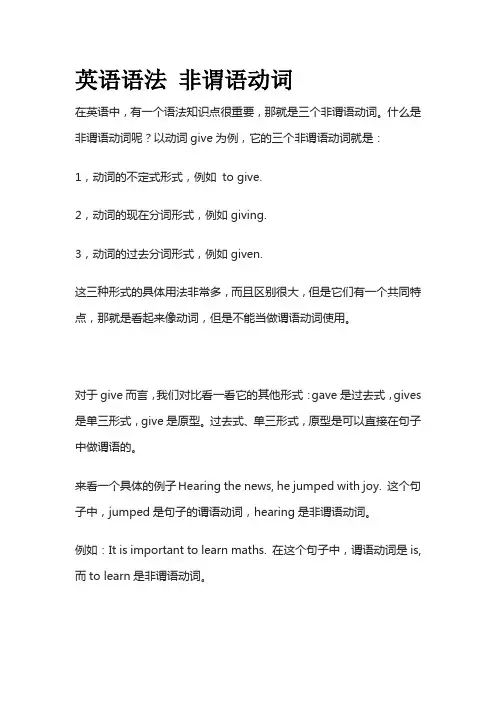
英语语法非谓语动词在英语中,有一个语法知识点很重要,那就是三个非谓语动词。
什么是非谓语动词呢?以动词give为例,它的三个非谓语动词就是:1,动词的不定式形式,例如to give.2,动词的现在分词形式,例如giving.3,动词的过去分词形式,例如given.这三种形式的具体用法非常多,而且区别很大,但是它们有一个共同特点,那就是看起来像动词,但是不能当做谓语动词使用。
对于give而言,我们对比看一看它的其他形式:gave是过去式,gives 是单三形式,give是原型。
过去式、单三形式,原型是可以直接在句子中做谓语的。
来看一个具体的例子Hearing the news, he jumped with joy. 这个句子中,jumped是句子的谓语动词,hearing是非谓语动词。
例如:It is important to learn maths. 在这个句子中,谓语动词是is, 而to learn是非谓语动词。
总结:动词的三个非谓语形式是:动词不定式、动词的现在分词形式,动词的过去分词形式。
这三种形式不能在句子中充当谓语。
这三个非谓语动词具体运用很多,接下来说一下它们非常常见的一种运用。
那就是在英语写句子时候,可以用到这三个非谓语动词来避免和纠正句子错误。
不少同学在写英语作文和写英语句子时候,经常错误地使用多个谓语动词。
接下来使用非谓语动词来修改一个错误句子。
错误句子是:Get exercise is important. 这个句子中,应该把get修改成其现在分词形式getting。
正确句子是:Getting exercise is important.以上是关于三个非谓语动词的类别解释,也解释了其在写句子时候的一种运用。

英语语法|非谓语动词的语态:逻辑主语非谓语动词的语态是指非谓语动作与它的“逻辑主语”之间的主被动关系。
什么叫做“逻辑主语”?非谓语动词虽然不作谓语,但依然保留着动词的特征,就是动词表示的动作一定有“执行者”,及物的动作会有一个“承受者”。
非谓语动作的执行者和承受者就是非谓语动词的逻辑主语。
比如:We will have many difficult problems to deal with. 我们会有许多棘手问题需要处理。
这里,不定式动作有两个逻辑主语,执行者是句子主语we,承受者是problems。
如何确定非谓语动词的逻辑主语?这与非谓语动词在句子里作什么成分有关,也与它们的复合结构有关。
具体说来,非谓语动词的逻辑主语的确定依据如下:1、如果非谓语动词在句子里作“状语”、“宾语”、“表语”,它的逻辑主语就是句中主语。
a. Not knowing what to do next, we went to the teacher for help. 因为不知道下一步怎么办,我们去求助老师。
是we不知道下一步怎么办,所以,作原因状语的非谓语动词短语(not knowing what to do next)的逻辑主语(执行者)是句子主语we。
b. She wishes to be sent to work in Tibet. 她希望派她去西藏工作。
she被派往西藏工作。
作宾语的非谓语动作(to be sent to work in Tibet)的逻辑主语(承受者)是句子主语she。
c. The symptoms are cunfusing and the doctors are confused. 病症令人不解,医生们困惑了。
and前面的句子里,句子主语symptoms是作表语的非谓语动词(confusing)的逻辑主语(执行者);后面的句子中,句子主语doctors是作表语的非谓语动词(confused)的逻辑主语(承受者)。
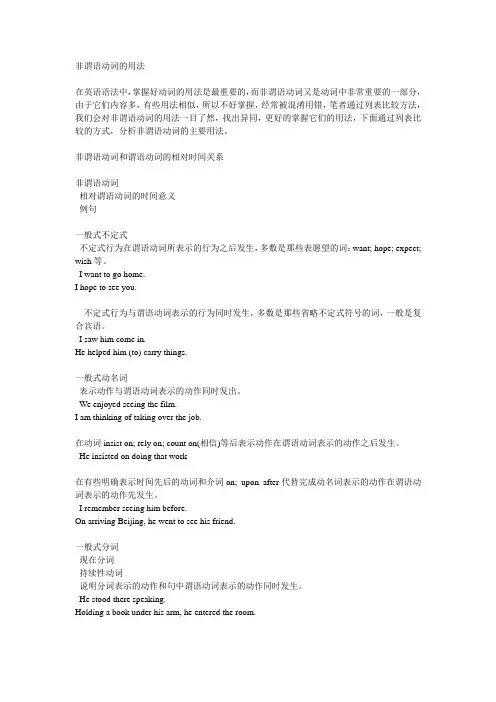
非谓语动词的用法在英语语法中,掌握好动词的用法是最重要的,而非谓语动词又是动词中非常重要的一部分,由于它们内容多,有些用法相似,所以不好掌握,经常被混淆用错,笔者通过列表比较方法,我们会对非谓语动词的用法一目了然,找出异同,更好的掌握它们的用法,下面通过列表比较的方式,分析非谓语动词的主要用法。
非谓语动词和谓语动词的相对时间关系非谓语动词相对谓语动词的时间意义例句一般式不定式不定式行为在谓语动词所表示的行为之后发生,多数是那些表愿望的词:want; hope; expect; wish等。
I want to go home.I hope to see you.不定式行为与谓语动词表示的行为同时发生,多数是那些省略不定式符号的词,一般是复合宾语。
I saw him come in.He helped him (to) carry things.一般式动名词表示动作与谓语动词表示的动作同时发出。
We enjoyed seeing the film.I am thinking of taking over the job.在动词insist on; rely on; count on(相信)等后表示动作在谓语动词表示的动作之后发生。
He insisted on doing that work在有些明确表示时间先后的动词和介词on; upon after代替完成动名词表示的动作在谓语动词表示的动作先发生。
I remember seeing him before.On arriving Beijing, he went to see his friend.一般式分词现在分词持续性动词说明分词表示的动作和句中谓语动词表示的动作同时发生。
He stood there speaking.Holding a book under his arm, he entered the room.终止性动词说明分词表示的动作发生之后,句中谓语动词表示的动作立刻发生。
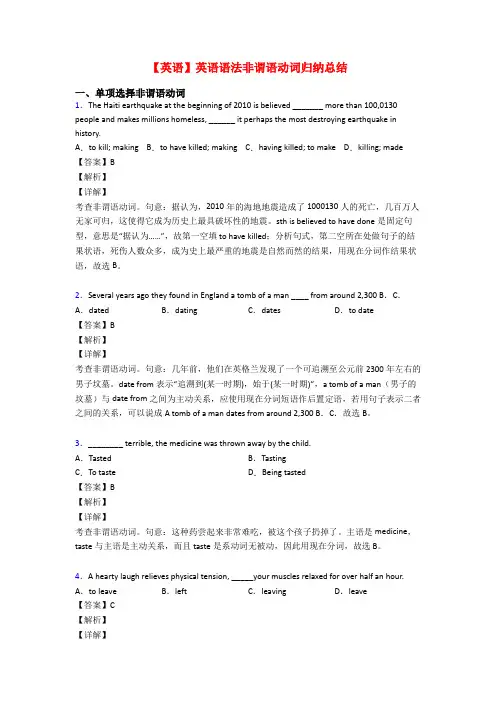
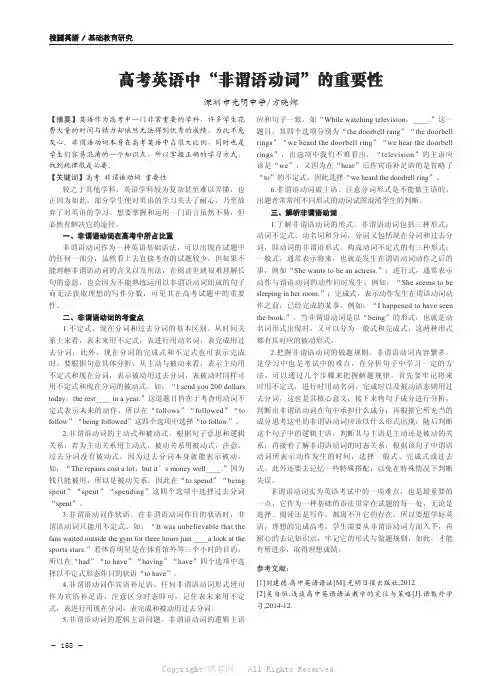
- 158-校园英语 / 基础教育研究高考英语中“非谓语动词”的重要性深圳市光明中学/方晓娜【摘要】英语作为高考中一门非常重要的学科,许多学生花费大量的时间与精力却依然无法得到优秀的成绩,为此不免灰心。
非谓语动词本身在高考英语中占很大比例,同时也是学生们容易混淆的一个知识点,所以掌握正确的学习方式,找到规律很是必要。
【关键词】高考 非谓语动词 重要性较之于其他学科,英语学科较为复杂甚至难以弄懂,也正因为如此,部分学生便对英语的学习失去了耐心,乃至放弃了对英语的学习。
想要掌握和运用一门语言虽然不易,但必然有解决它的途径。
一、非谓语动词在高考中所占比重非谓语动词作为一种英语基础语法,可以出现在试题中的任何一部分,虽然看上去直接考查的试题较少,但如果不能理解非谓语动词的含义以及用法,在阅读里就很难理解长句的意思,也会因为不能熟练运用以非谓语动词组成的句子而无法获取理想的写作分数,可见其在高考试题中的重要性。
二、非谓语动词的考查点1.不定式、现在分词和过去分词的基本区别。
从时间关系上来看,表未来用不定式,表进行用动名词,表完成用过去分词;此外,现在分词的完成式和不定式也可表示完成时,要根据句意具体分析;从主动与被动来看,表示主动用不定式和现在分词,表示被动用过去分词,表被动时同样可用不定式和现在分词的被动式。
如:“I send you 200 dollars today,the rest____ in a year.”这道题目旨在于考查用动词不定式表示未来的动作,所以在“follows”“followed”“to follow”“being followed”这四个选项中选择“to follow”。
2.非谓语动词的主动式和被动式。
根据句子意思和逻辑关系,若为主动关系用主动式,被动关系用被动式,注意,过去分词没有被动式,因为过去分词本身就能表示被动。
如:“The repairs cost a lot,but it’s money well____.”因为钱只能被用,所以是被动关系,因此在“to spend”“being spent”“spent”“spending”这四个选项中选择过去分词“spent”。
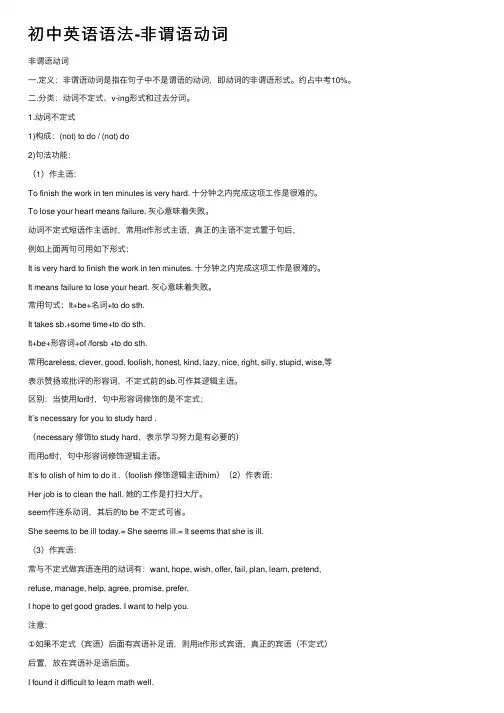
初中英语语法-⾮谓语动词⾮谓语动词⼀.定义:⾮谓语动词是指在句⼦中不是谓语的动词,即动词的⾮谓语形式。
约占中考10%。
⼆.分类:动词不定式、v-ing形式和过去分词。
1.动词不定式1)构成:(not) to do / (not) do2)句法功能:(1)作主语:To finish the work in ten minutes is very hard. ⼗分钟之内完成这项⼯作是很难的。
To lose your heart means failure. 灰⼼意味着失败。
动词不定式短语作主语时,常⽤it作形式主语,真正的主语不定式置于句后,例如上⾯两句可⽤如下形式:It is very hard to finish the work in ten minutes. ⼗分钟之内完成这项⼯作是很难的。
It means failure to lose your heart. 灰⼼意味着失败。
常⽤句式:It+be+名词+to do sth.It takes sb.+some time+to do sth.It+be+形容词+of /forsb +to do sth.常⽤careless, clever, good, foolish, honest, kind, lazy, nice, right, silly, stupid, wise,等表⽰赞扬或批评的形容词,不定式前的sb.可作其逻辑主语。
区别:当使⽤for时,句中形容词修饰的是不定式;It’s necessary for you to study hard .(necessary 修饰to study hard,表⽰学习努⼒是有必要的)⽽⽤of时,句中形容词修饰逻辑主语。
It’s fo olish of him to do it .(foolish 修饰逻辑主语him)(2)作表语:Her job is to clean the hall. 她的⼯作是打扫⼤厅。
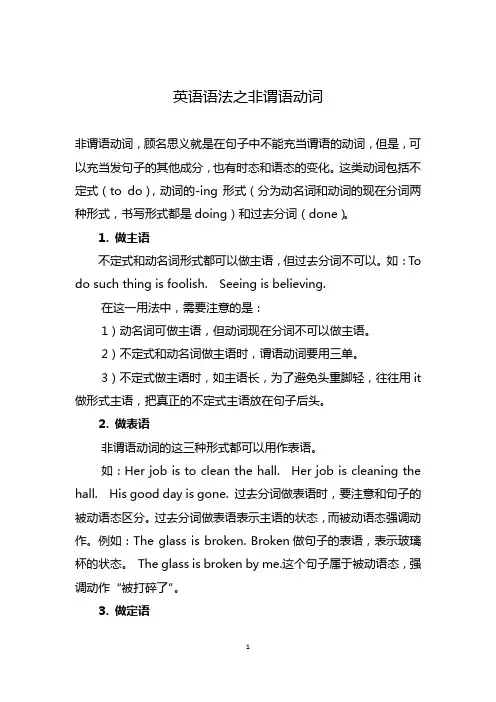
英语语法之非谓语动词非谓语动词,顾名思义就是在句子中不能充当谓语的动词,但是,可以充当发句子的其他成分,也有时态和语态的变化。
这类动词包括不定式(to do),动词的-ing形式(分为动名词和动词的现在分词两种形式,书写形式都是doing)和过去分词(done)。
1. 做主语不定式和动名词形式都可以做主语,但过去分词不可以。
如:To do such thing is foolish. Seeing is believing.在这一用法中,需要注意的是:1)动名词可做主语,但动词现在分词不可以做主语。
2)不定式和动名词做主语时,谓语动词要用三单。
3)不定式做主语时,如主语长,为了避免头重脚轻,往往用it 做形式主语,把真正的不定式主语放在句子后头。
2. 做表语非谓语动词的这三种形式都可以用作表语。
如:Her job is to clean the hall. Her job is cleaning the hall. His good day is gone. 过去分词做表语时,要注意和句子的被动语态区分。
过去分词做表语表示主语的状态,而被动语态强调动作。
例如:The glass is broken. Broken做句子的表语,表示玻璃杯的状态。
The glass is broken by me.这个句子属于被动语态,强调动作“被打碎了”。
3. 做定语不定式,动词的ing形式,过去分词都可以做定语,但所表示的意义并不相同。
例如:I have a lot of work to do. She is a sleeping beauty. He takes sleeping pills every day. The stolen book is as same as his.1)不定式做定语表示将来的动作。
例句中的不定式表明将要做的工作还有很多。
2)动名词做定语时,表示作用和用途,如例句中的“sleeping pill”, pill的作用是to sleep。
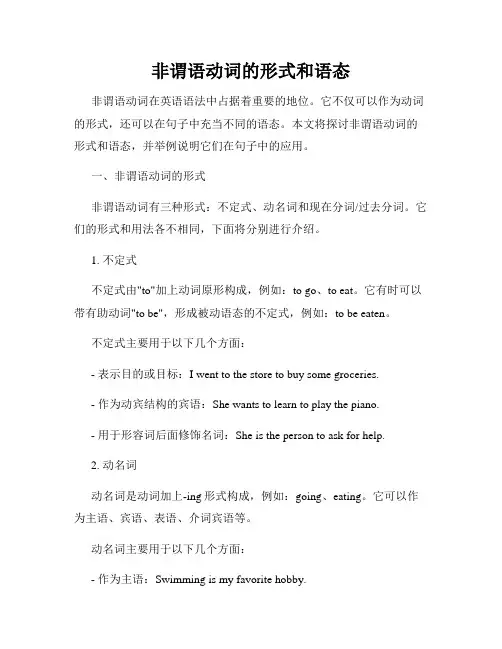
非谓语动词的形式和语态非谓语动词在英语语法中占据着重要的地位。
它不仅可以作为动词的形式,还可以在句子中充当不同的语态。
本文将探讨非谓语动词的形式和语态,并举例说明它们在句子中的应用。
一、非谓语动词的形式非谓语动词有三种形式:不定式、动名词和现在分词/过去分词。
它们的形式和用法各不相同,下面将分别进行介绍。
1. 不定式不定式由"to"加上动词原形构成,例如:to go、to eat。
它有时可以带有助动词"to be",形成被动语态的不定式,例如:to be eaten。
不定式主要用于以下几个方面:- 表示目的或目标:I went to the store to buy some groceries.- 作为动宾结构的宾语:She wants to learn to play the piano.- 用于形容词后面修饰名词:She is the person to ask for help.2. 动名词动名词是动词加上-ing形式构成,例如:going、eating。
它可以作为主语、宾语、表语、介词宾语等。
动名词主要用于以下几个方面:- 作为主语:Swimming is my favorite hobby.- 作为宾语:I enjoy playing basketball.- 作为表语:Her favorite activity is dancing.3. 现在分词/过去分词现在分词由动词原形加上-ing构成,过去分词则根据动词的不同形式而变化,例如:going、eaten。
它们可以作为形容词修饰名词。
现在分词和过去分词主要用于以下几个方面:- 作为非限定性定语:The dog, barking loudly, scared the mailman.- 作为限定性定语:I saw a broken glass on the floor.- 作为表语:The situation seems confusing.二、非谓语动词的语态非谓语动词在句子中可以具有主动语态或被动语态。
非谓语动词用法精讲分词作状语的用法和常见形式非谓语动词用法精讲:分词作状语的用法和常见形式非谓语动词是指不作谓语,不具备时态和人称变化的动词形式,包括不定式、动名词和分词。
其中,分词作为非谓语动词的一种形式,常常被用作状语来修饰句子的主语、宾语或其他成分。
本文将重点讲解分词作为状语的用法和常见形式。
一、分词作状语的用途分词作为状语可以表示时间、原因、条件、结果、方式等不同的语义关系。
根据这些关系,分词可以用作时间状语、原因状语、条件状语、结果状语和方式状语。
1. 分词作时间状语分词作时间状语时,可以表示动作发生的时间、顺序或同时性等。
常见的分词形式包括现在分词和过去分词。
- Walking along the river, I saw a beautiful sunset.- Having finished my homework, I went out to play.- Having been a teacher for many years, he knows how to handle students.2. 分词作原因状语包括现在分词和过去分词。
- Being tired, she decided to take a nap.- Seen from the top of the mountain, the city looked magnificent.- The car crashed into a tree, causing serious injuries.3. 分词作条件状语分词作条件状语时,可以表示动作发生的条件。
常见的分词形式包括现在分词和过去分词。
- Provided with enough resources, they can finish the project on time.- Weather permitting, we will have a picnic in the park.- Given the circumstances, I had no choice but to accept the offer.4. 分词作结果状语分词作结果状语时,可以表示动作的结果或效果。
非谓语动词表结果的用法在英语学习中,非谓语动词一直是一个重要且具有一定难度的语法点。
其中,非谓语动词表结果的用法更是常常让学习者感到困惑。
那么,什么是非谓语动词表结果呢?简单来说,就是通过某些非谓语动词的形式来传达一种动作所产生的结果。
我们先来了解一下常见的可以用来表结果的非谓语动词形式,主要有现在分词、过去分词和不定式。
现在分词作结果状语,表示一种自然而然的、意料之中的结果。
例如:“The fire lasted nearly a month, leaving nothing valuable”在这个句子中,“leaving nothing valuable”就是现在分词短语作结果状语,表示“大火持续了近一个月,结果没留下任何有价值的东西”,这种结果是基于前面“大火持续近一个月”这个动作自然而然产生的。
再看过去分词作结果状语,它通常表示一种被动的、已经完成的结果。
比如:“He was caught in the rain, covered in mud all over” 这里的“covered in mud all over”是过去分词短语作结果状语,意思是“他被雨淋了,结果浑身都是泥”,“被覆盖着泥”是一种被动的结果。
而不定式作结果状语,则往往表示一种出乎意料的、令人意想不到的结果。
举个例子:“He hurried to the station, only to find the train had left” “only to find the train had left”就是不定式作结果状语,表示“他匆忙赶到车站,却发现火车已经开走了”,这种结果是出乎他意料的。
为了更好地理解和掌握非谓语动词表结果的用法,我们来通过一些具体的例子进行分析。
比如说:“The snow storm lasted for a whole day, causing many accidents on the road” 在这个句子中,“causing many accidents on the road”是现在分词短语作结果状语,暴风雪持续一整天,从而导致了路上的许多事故,这种结果是比较自然和符合逻辑的。
高中英语语法:非谓语动词总结-大全非谓语动词的含义非谓语动词首先是一种动词形式,其次是这种动词形式不能做谓语,综合这两点,我们将其叫做非谓语动词。
非谓语动词的形式非谓语动词包含四种形式,即不定式、动名词、现在分词和过去分词。
其中,每种形式按照发生时间和主被动又包括不同的子形式。
具体如下:1. 不定式①基本形式:to do(表示主动,并且一般表示将来)②被动式:to be done(表示被动,并且一般表示将来)③进行式:to be doing (表示主动和进行)④完成时:to have done(表示主动和完成)⑤完成被动式:to have been done(表示被动和完成)⑥完成进行式:to have been doing (表示主动和完成进行)The teacher told us to do morning exercises. 老师让我们做早操。
The car to be bought is for his sister. 要买的这辆车是给他的姐姐的。
She pretended to be reading when the teacher came into the classroom. 老师进来时,她假装正在读书。
The thief is said to have escaped. 据说小偷已经逃跑了。
The thief is said to have been arrested. 据说小偷已经被抓住了。
She is said to have been working in the factory over the last 20 years. 据说在过去的20年里,她一直在这家工厂工作。
2. 动名词①基本形式:doing (表示主动)②被动式:being done(表示被动)③完成式:having done(表示主动和完成)④完成被动式:having been done(表示被动和完成)Travelling in space by ordinary people will be common in the future. 在未来,普通人在太空旅行将会是普遍的事情。
英语语法——非谓语动词一. 非谓语动词种类及句法功能(一)概述:在英语中,不作句子谓语,但仍具有除谓语外其他语法功能的动词,叫做非谓语动词。
非谓语动词有动词不定式(the Infinitive);动名词(the Gerund);现在分词(the Present Participle);过去分词(the Past Participle)。
(二)非谓语动词的句法功能1)逻辑主语为了强调是谁发出的一个动作,我们往往要有主语来明确表现。
由于非谓语动词在句中不做谓语,所以强调谁发出的动作就不明显。
但它又有动词的某些特征,在这种情况下,就有了其逻辑上的主谓关系。
在英语中,非谓语动词的逻辑主语各有其不同的表现方式,也是常考的一个语法项目,尤其是动名词和分词的逻辑主语。
现在来简要分析一下在不定式、动名词和分词中的逻辑主语。
①不定式的逻辑主语是同过介词of 和for来体现的。
这两个介词使用的区别是:当表语是表示主语的性质或特征时(如:good, nice, wise, generous, foolish, clever, silly, wrong, stupid, careless, considerate, impolite, naughty等等),我们使用of; 其它的使用for。
请看例句:It is unwise of them to turn down the proposal. 他们拒绝这个建议很不明智。
It is generous of you to stay us for the night. 难为你这么慷慨留我们过夜。
It is a great honor for us to attend this rally. 我们很荣幸参加这个大会。
It is very dangerous for children to swim in the reservoir. 孩子们在水库里游泳很危险。
②动名词的逻辑主语是在动名词前用名词或代词来表现的。
在句首时一般要使用所有格,在句中一般使用其通格。
例如:Mary’s grunting continuously annoyed her husband, and her mother’s staying with them was the last straw.玛丽的不断唠叨已经使她丈夫很烦,她母亲来和他们一块住更使他们的关系雪上加霜。
Xiao Li’s being late for school upset the teacher.小李的迟到让老师很恼火。
Our sole worry is (you) your relying on youself too much.我们唯一的担心是你这个人太相信自己了。
They insisted (Xiao Wang) Xiao Wang’s going with them together.他们坚持要小王和他们一块走。
③分词的逻辑主语有两种:一是悬垂分词的逻辑主语,其二是独立主格结构的逻辑主语。
在悬垂结构中,分词的逻辑主语就是主句的主语,如果两者不能构成逻辑上的一致关系则该句结构是错误的.如:Seen from the space, the earth look like a blue ball. 从太空看起来,地球像个兰色的球体。
这个悬垂结构seen from the space = when the earth is seen, …Laughing and chatting, the puples left school for home. 孩子们说说笑笑回家去了。
同上述结构一样,Laughing and chatting = the pupils were laughing and chatting, … 独立主格结构与悬垂结构不同的是独立结构有自己的主语。
这个主语有名词或代词通格来表示,放于分词之前,与分词形成逻辑上的主谓关系。
例如:So many comrades being absent, the meeting had to be put off.这么多同志都缺席了,所以会议只得延期。
We all went home, he remaining behind. 我们都回家了,只有他留在后面。
Weather permitting, we will go for an outing next week. 如果天气许可,我们下周去郊游。
The class (being) over, the teacher dismissed the students. 下课了,老师把学生打发走了。
The job done, we all went home. 工作完成之后,我们就都回家去了。
With the tree grown tall, we get more shade. 岁着树的不断长高,树阴也越来越浓密了。
Everything taken into consideration, this plan seems to be more feasible.把一切考虑在内,这个计划看起来可行。
They worked throughout the night with the lamp lighted. 他们挑灯夜战。
2)宾语第一类是有些动词之后面只能使用动名词做宾语。
这些动词有:admit(承认),acknowledge, appreciate(感激), avoid, consider, contemplate, delay, deny, detest, endure, enjoy, excuse, evade, face, finish, facilitate, fancy, favor, forgive, can’t help, imagine, include, involve, mention, mind, miss, postpone, practise, pardon, resent, resist, require, risk, stand, suggest, understand, be worth, feel like, can’t stand, think of, dream of, be fond of, prevent … (from), keep … from, stop …(from, protect … from, set about, be engaged in, spend … (in), succeed in, be used to, look forward to, object to, pay attention to, insist on, feel like等等。
如:They haven’t finished building the dam. 他们还没有建好大坝。
We have to prevent the air from being polluted. 我们必须阻止空气被污染。
He is considering changing a job. 他正在考虑换个工作。
第二类是既能带动名词又能带不定式作宾语的动词:attempt, begin, cease, continue, dread, forget, hate, intend, like, neglect, omit, prefer, propose, remember, start, try. 具体使用情形请看下述详细解释:①在begin, start, continue, like, hate, cease等后可以使用两种结构,无有区别。
如:Will you continue gardening/to garden after dinner? 饭后你继续干花园的活,好吗?She likes to be flattered/being flattered. 她喜欢别人奉承她。
②need, want, require, deserve等动词表示“需要,值得”时,有两种结构可以用:一是使用动名词的主动式表被动;二是使用不定式的被动式。
两者没有意义上的区别。
如:The flowers want watering. = The flowers want to be watered. 花该浇水了。
My hair needs cutting. = My hair needs to be cut. 我的头发该理了。
His performance deserves praising. = His performance deserves to be praised.他的工作应该受到表扬。
③remember, forget, regret等后面使用动词不定式表示未发生的动作;而使用动名词时表示已经发生的动作。
如:I regret to inform you that we are unable to offer you employment.我很遗憾地通知你我们无法安排你的就业。
I regret being unable to help you. 我很遗憾当时未能帮你。
Don’t forget to post the letter on your way to work. 别忘了上班的路上把信寄走。
I forget posting the letter you gave me thins morning. 我忘了把你今天早上给我的信发走。
④try后跟动名词表示“试一试”;和动词不定式连用表示“努力,试图”。
This foreign guest tried writing with the Chinese brush. 这位外国客人试着用毛笔写字。
He tried to cheat the old man out of his money. 他试图骗这老头的钱。
⑤mean, intend后跟动名词表示“意味着”;接不定式表示“打算”。
如:Today, I intend to finish reading this book. 今天我打算读完这本书。
What he said at the meeting means his going abroad next year.他在会上说的意思是他要出国。
⑥prefer后使用动名词还是不定式有这么两种情况:当我们谈论一般情况时和当我们说在两种活动之间更喜欢哪一种的时候,一般使用动名词;另一种是和不定式连用,一般用来引导另一个短语。
如:Do you like swimming? ------- Yes, but I prefer sailing.你喜欢游泳吗?--- 当然。